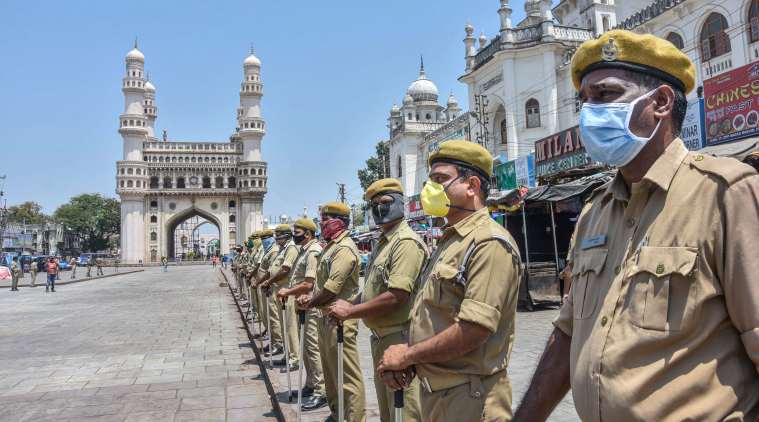
Relaxed COVID norms to save 'Brand Hyderabad' image worked wonders
The keenness of the Telangana government to keep the ‘Brand Hyderabad’ image intact and the business going on despite the surge in COVID-19 cases in the first phase of the pandemic, seems to have paid rich dividends.

The keenness of the Telangana government to keep the ‘Brand Hyderabad’ image intact and the business going on despite the surge in COVID-19 cases in the first phase of the pandemic, seems to have paid rich dividends.
One in two people in Hyderabad has developed antibodies for COVID-19. While most of the states had sealed their borders and implemented a strict COVID-19 protocol restricting the movement of people and functioning of offices, the Telangana government had allowed all activities, of course with necessary protocols. The government received huge criticism from across for the poor tackling of the pandemic, poor testing and ignoring the surge. It faced court cases for hiding data and not being transparent with information on the situation.
After more than 10 months, what state officials call their earlier approach as a ‘strategy’ seems to have worked well – on one hand, the ‘Brand Hyderabad’ image has remained intact with no severe loss in business activities, and on the other, the city is heading towards what scientists call herd immunity.
The Centre for Cellular and Molecular Biology (CCMB), a premier research body, has found that 54 per cent of people, who were studied, have had COVID-19 without them knowing that they were infected. Even now, which scientists fear is phase-II of COVID-19 in Telangana, most of the cases are asymptomatic that do not require hospitalisation.
However, scientists are hopeful that Hyderabad may put the mortality rate under check even if there is spurt in the positive cases, thanks to the 54 percent sero-positivity. Even the positive cases may be mild, they say.
The sero-survey was conducted jointly by the CCMB, National Institute of Nutrition (NIN) and Bharat Biotech with a sample size of 9,000 (aged above 10 years) across 30 municipal wards in Hyderabad during mid-January. Women showed a slightly better sero-positivity rate of 56 per cent as against 53 per cent in men. Those having previously infected family members showed more resistance (78 percent). Exposure to the virus is the primary reason for the rise in immunity.
Related news | Déjà vu: Trajectory of COVID cases reflective of last July’s growth
Scientists are hopeful that another 10% herd immunity would be added if vaccination is stepped up to cover at least 20 per cent of the population in the next three to four months.
“We may add another 10 per cent induced immunity through vaccines. Thus, the city will get closer to 65-70 per cent immunity in three to four months if vaccination is stepped up,” CCMB director Rakesh Mishra told The Federal. However, scientific bodies do not rely on the state government’s data on COVID-19 cases.
As of March 23, as many as 7.86 lakh people got the first dose of vaccine and 2.24 lakh were administered the second dose.
State officials point out that the sero-survey held in Kerala during the same period showed 10.7 per cent herd immunity.
Signs of second wave
Telangana has been showing signs of a second wave though it has not been officially acknowledged yet. The number of cases is increasing by the day. The government has closed down all educational institutions, except medical colleges, from Monday (March 24). Other commercial activities are on with riders that guidelines should be followed.
Cinematography minister T Srinivas Yadav has said that theatres would remain open with COVID-19 protocols.
State health department officials are confident of tackling it if there is a second wave. “Doctors have gained the knowledge of treatment and immunity levels among people have gone up. There will be no need for harsh steps like lockdown. Effective enforcement of the guidelines such as masks and physical distancing will keep Hyderabad in a better place,” an official said.
Public health director Dr G Srinivasa Rao said the number of tests was increased to 50,000 per day, which is more than double the tests till early this month. The department has kept the official machinery on alert, besides instructing hospitals to stay ready with spare beds and wards, if required.
Related news | Sudden closure of schools in Telangana leaves the poor high and dry
On March 23,431 persons tested positive. This is the highest figure in the current calendar year and it took the cumulative number to 3,04,298. Two deaths were reported, taking the total to 1,676. The fatality rate is 0.55, as against India’s 1.4 per cent. More than 50 per cent of the positive cases are reported from Hyderabad (111) and the four adjoining districts, Malkajgiri, Medchal, Vikarabad and Siddipet.
CCMB’s Rakesh Mishra says the second wave might be weak or delayed by a few weeks. “Earlier, we saw the infection surfacing in Kerala and then gradually in other areas. This time, Maharashtra reported the highest number of cases and then Punjab and other states. Now, most of the samples coming to us from Telangana and Andhra Pradesh are of the UK variant. This is less harmful. Most of these cases pertain to those having travel history or such primary contacts,” he elaborated.
Hyderabad, according to him, stands ahead of other cities on the herd immunity front.
Hyderabad in particular and Telangana in general is recording about 90 per cent of the COVID-19 cases as asymptomatic. While this may be good for the infected persons, they may spread the infection by innocently moving around, Mishra says.


